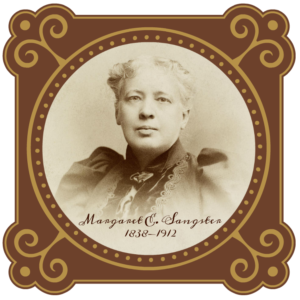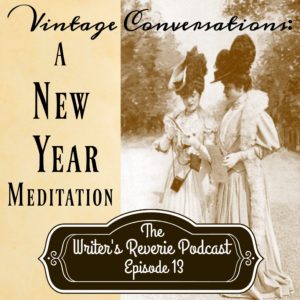I stash books in every corner of my home. There’s not a single wall in my house where you won’t see at least one vintage book artfully displayed. I rescue old volumes in cloth covers with pre-1940s copyrights. When I’m thrifting or browsing for treasures in antique shops, my eyes are alert to catch a gold embossed hardcover spine by a classic author. My mantle is a showplace for early volumes of Dickens, Tennyson, and Van Dyke—notable names among a host of lesser-knowns, but no less worthy wordsmiths in their day.
Vintage books are my favorite reads and go-to props for decorating year-round. Recently I came across a volume that captured my attention with a gold embossed spine and faded portrait of a gentle woman’s face on the cover.
It was that of 19th century American poet, author, and editor, Margaret Elizabeth Sangster. In her day, she was a prolific writer who explored family and faith themes with thoughtful devotional reflections, hymns, and sacred texts.
Born in 1838, she lived in New York and New Jersey, growing up in a Christian home. Honing her writing skills in her youth, she delayed her publishing aspirations throughout her thirteen-year marriage to George Sangster, until his death in 1871. A widow in her mid-thirties, she chose not to remarry, and pursued a career as writer/editor with a number of popular publications for women and Christian readers including Hearth and Home and Harper’s Bazaar. She was a contributing writer to Ladies’ Home Journal, The Christian Herald, and dispensed wisdom in a regular column of the Woman’s Home Companion. In addition, she published several volumes of children’s stories, poetry, and inspirational collections for women—including The Joyful Life, published in 1903 by the American Tract Society—my new treasure for devotional reading.
As we enter a new year holding great promise for Christians world-wide, and especially for writers creatively communicating Christ through their words, it is useful to review the timeless advice from writers of the past. We learn that, as a society, we don’t really change as much as we like to think we do. The window dressings of style and trends might—but the driving force of the human heart condition does not. Like Jesus, humans are the same yesterday, today, and tomorrow—ever in need of His saving grace and wise words for practical application in whatever epoch of time God has allotted to us.
Mrs. Sangster’s 19th century words soak into my heart and mind as we enter 2019. Her gentle compassion and compelling wisdom in applying biblical principles to everyday life read fresh and relevant to my life as a Christian woman a century after she penned the words.
So, to kick off this new year, I invite you to visit with Mrs. Sangster in select excerpts from a chapter of The Joyful Life, published by the American Tract Society in 1903. We listen in on a vintage conversation between the author and her intimate friend from school days, Miriam.
May you drink deep from her wells of wisdom and listen to this woman writer’s heart in this New Year’s Meditation:
Of Old School Days: “There Were Well Educated Women”
One of my old schoolmates, a girl who used to sit at the same desk with me when we were in our teens, came not long ago to make me a little visit. In our different ways we have both been very busy since those bright days when we studied French verbs and Latin conjugations together, and dipped into mathematics and explored ancient history, albeit our school was only a seminary for young ladies, and the era of the woman’s college had not yet dawned.
In passing, let me say a good word for the fidelity of the old-time preceptors and the thoroughness of the instruction they imparted. I am not disposed to undervalue anything in the latter curriculum, but there were well-educated women, cultured, disciplined, and broadened by their intellectual training, before the great colleges set wide doors open for the entrance of girl students. After all, the best result of an education course is seen in its success in putting tools in the hand for use in the life-work, and in the symmetry with which it develops character.
Of Aging Well: “The Golden Age of the Grandmother”
Miriam is a bright, breezy person whose heart is the gayer because she is the mother of a house full of children, and has always had young people about her, needing her counsel. She does not look her real age, but then nobody does that any longer; we are all ten years younger than we used to be, so much more closely do we follow the laws of health, and so much greater is the ease of modern living, what with labor-saving contrivances and luxuries of which our mothers and grandmothers never dreamed.
Today, the woman, married or single, who is under forty years is a young woman, and her looks convey no other impression. At fifty the gracious lady bears herself as thirty-five was wont to do two score years ago, and the active person of sixty is far from claiming immunity from service, or any privileges of ease, on account of her age. Miriam and I felicitated ourselves that this is the golden age of the grandmother.
On Passing Years: “The Seasons Do Glide Faster”
“But, my dear,” said my friend musingly, “how short the years are getting to be. Don’t you recall what a long, long space of time a year was when we were children? Now twelve months is a little flitting period, which makes one think of the simile of a bird flying through a lighted hall, from blackness to blackness.”
“Well,” I answered, “I grant that the seasons do glide faster with one than of old, but I think it is simply because I have so much to do, and so many complex interests. I can fancy, however, those to whom the progress of time is slow enough, even in old age. The man who was once in the midst of affairs, but on whom a creeping paralysis has set its fettering hand; the woman chained to her bed by a cruelly torturing malady; the prisoner in his cell; the stranger lonely among strangers, may not find the years so swift. Part of the restlessness which makes some old people so unhappy is no doubt due to the fact that their empty days have grown slow and dragging, that there is no flavor left for them in life’s cup. People in the shadow of grief always suffer from the tedium of the days. The mourner’s days move at a snail’s pace.”
On Resolutions: “Turning the Fresh Page”
After a while she said, “Another year is coming. Are you making any new departures, any new resolves? There is something attractive about turning the fresh page, isn’t there?”
“I have long felt that every day is a fresh beginning, and I have laid aside the habit, if I ever had it, of celebrating the new year as a special place for good resolutions. I do like, though, to signalize it by some particular pleasure, to meet my friends and kinsfolk then, and to exchange greetings and good wishes with them. If the calendar did nothing else, it would remind us that the chances for making our beloved ones happy are lessening and that we ought to avail ourselves of every coming opportunity to scatter sunshine on the pathway of all we meet.”
On the Christian Race: “A Daily Definite Study of the Bible”
“But,” persisted Miriam, “you would not influence others to pass by a New Year’s milestone without some effort to start anew in the Christian race, would you? Suppose you were talking to a crowd of students, is there nothing you could suggest as very apposite to them at such a time?”
“For one thing, I said, I would counsel all who have never done it, to begin on January first a daily definite study of the Bible. There is a good deal of Bible study just now, it is true, but also, in hundreds of Christian homes, and by thousands of young men and women, the Bible is a neglected book. The young people who are familiar with the Scriptures are not too numerous—those I mean who can turn at an instant’s call, without hesitation or embarrassment, to any reference text in the prophets, the psalms, or the New Testament. We live in an age of much literary enterprise, when the printing press scatters new books as the forest trees scatter leaves in the autumn; when newspapers are multitudinous, and every man, woman, and child reads something. That many otherwise liberally educated men and women do not know the Scriptures, even as literature, is a misfortune, for they are a treasury of noble words in many incomparable styles. And, by searching them, those who would obtain eternal life still are required by the Divine Author. Yes, I wish I could urge the young people of our land, wherever they are, to begin to read the Bible daily, to read it through in course, or to read it for its poetry, history, and philosophy. I wish they would read it for the life of the Master. On a shelf in my library are many lives of Christ. But none equals, nor approaches, the life so simply revealed in the gospels of the four evangelists.”
On Youth: “A Clever Young Girl Was With Us”
This talk of ours was resumed on another occasion when Miriam and I were not alone. A clever young girl was with us, and she had her opinion and expressed it very earnestly.
“I know,” she said, “what people of my age need, and that is agreeable companionship. We are restless and dissatisfied unless we are in the midst of things. I would tell everyone I knew, especially if she or he happened to be a little blue, as young people often are, to get to work, not merely in wage-earning work, though for many that is a necessity and to some a resource and duty, but to join a Christian Endeavor Society and give to it the best one could. A good time to join the procession of Christian workers is surely the New Year. I do think young people should assist their pastors more than they do, and what better season for a start than at this very time?
So spoke Caroline, and we older women agreed with her. The only life worth living is the life of Christian love. If it be a life after the fair Christ-pattern, it will be a life poured out for others, and therefore very blessed.
On Filling the Days: “With Contentment, Surrender, and Sweetness”
Friends, methinks we stand in the portal of another year. God gives us more days, more weeks, how many or how few we know not, but they are sent straight from heaven, and we are to use them for him. Have we made mistakes? It is not too late to rectify them. Have we committed sin? We may find cleansing in the fountain where all uncleanliness is washed away. Have we been discouraged? “As thy days, thy strength shall be,” is the word of the Lord to our weariness and faintness. As we wait, not knowing what shall be on the morrow, we many fill the measure of today with contentment, surrender and sweetness. And from the sky the everlasting Father, speaking to our need, says, “Certainly I will be with thee!”
Portions of this article were adapted from originally published works by Kathryn Ross in RUBY Magazine, December 2016 and January 2017— It includes an edited version of the chapter “A New Year Meditation” from the book The Joyful Life by Margaret E. Sangster, published by the American Tract Society in 1903. To enjoy the full chapter in an audio dramatization, visit The Writer’s Reverie PODCAST.
Writer-speaker, Kathryn Ross, ignites a love of literature and learning through Pageant Wagon Publishing. She writes and publishes homeschool enrichment and Christian living books for home, church, and school. In addition, she shepherds writers through the steps book development and production. Her passion to equip women and families in developing a Family Literacy Lifestyle, produces readers and thinkers who can engage the world from a biblical worldview. She blogs and podcasts at TheWritersReverie.com and PageantWagonPublishing.com. Connect with Miss Kathy on Facebook.







No Comments